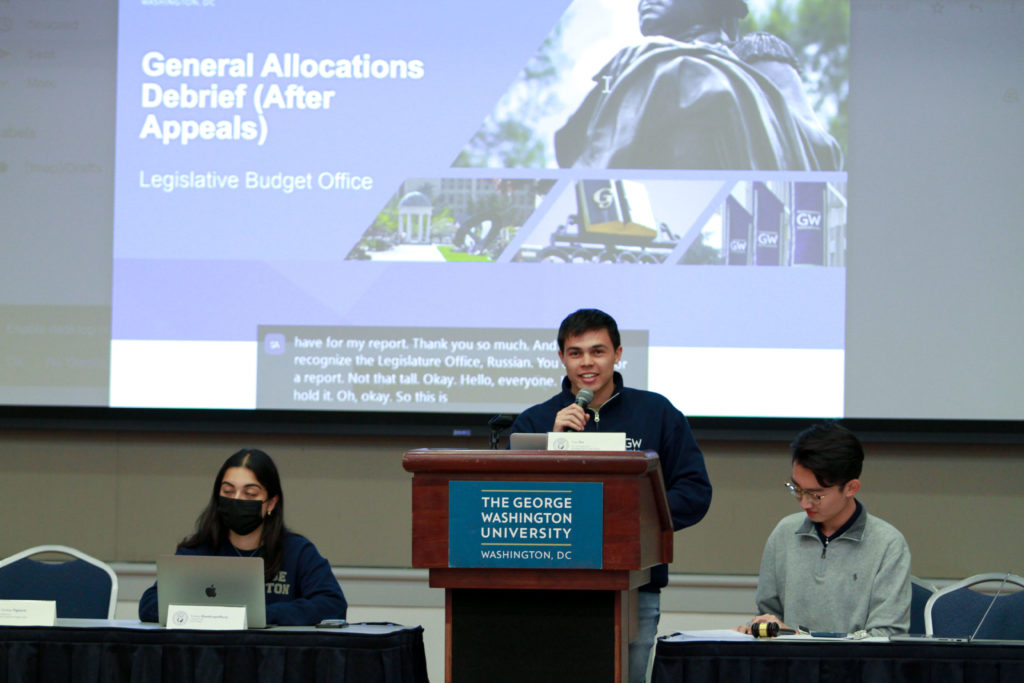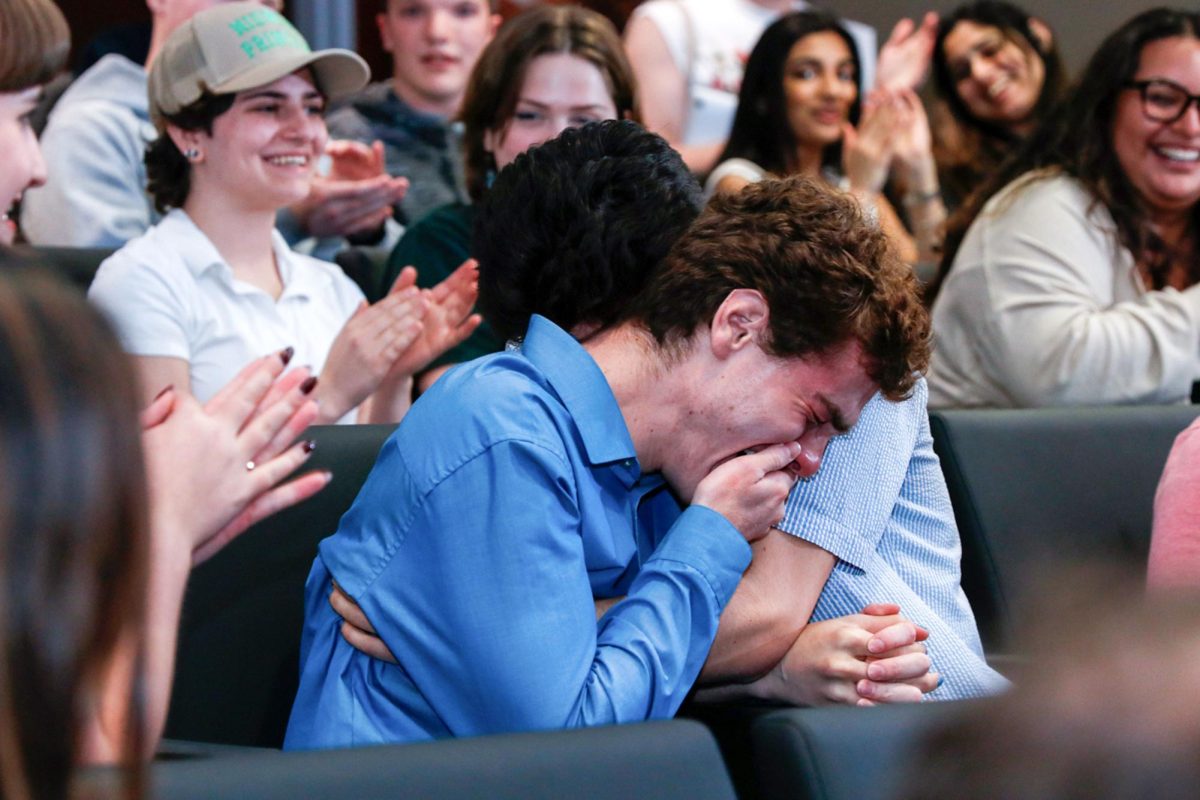The Student Association Senate approved general allocations for student organizations in the upcoming fall semester during their meeting last week.
Senators unanimously passed a bill allocating about $265,000 to student organizations for the fall semester, an increase from the spring when the senate distributed $240,000 to organizations. Nathan Nguyen, the director of the Legislative Budget Office, said requests for funding from organizations totaled roughly $1.7 million dollars this term.
Nguyen said 280 student organizations applied for SA funding for the fall semester, a slight decrease from the 296 organizations to request funding in the spring. He said the drop may have been due to organizations not re-registering or forgetting to reapply for funding.
“The requests totaled about $1.7 million, and we had $459,000 available,” Nguyen said at the Monday meeting. “That includes everything with general allocations, immediate disbursement, appeals and it also includes the club sports budget.”
Nguyen said the senate changed the club sports budget to give allocation power to the Club Sports Council — a separate governing body consisting of a representative from each club sport — to allocate funds from the senate and decide how much money each sport will receive, pending final approval from the finance committee.
“We give them a bucket of money and then they’re free to deliberate and then the finance committee has oversight and approval on the final numbers,” Nguyen said.
Nguyen said unlike the senate — which allocated funds for solely the fall semester — the Club Sports Council decided to allocate funds to club sports for the entire 2023-24 academic year, contributing to the $1.2 million gap between the funds requested and the funds allocated.
“This number of what’s available is slightly inflated because they spent a majority of their budget as opposed to us,” he said.
Nguyen said the approval rate of requests granted to student organizations increased to 36 percent this cycle, a jump from the 29 percent approval rate from the previous cycle.
Newly elected SA President Arielle Geismar said during her campaign she plans on auditing the general allocations process and hosting training sessions to inform organizations on how the allocations process works.
EMeRG, which provides emergency transportation and responds to student distress calls, received the largest share of non-club sports funding with $9,500 in allocations — less than a third of their request for roughly $27,000. Eight student organizations did not receive any of their requested funds, including the Black Public Health Student Network, the Education Policy Student Association and the Organization of Asian Studies.
Leaders of two student organizations that received more than $3,000 in allocations said that while they are grateful for the funds they received, they feel that the general allocations process is unreliable.
[gwh_image id=”1189115″ credit=”An Ngo | Designer” size=”large” align=”center” /]
The senate disbursed $3,620 to GW Bands after the group requested $12,114.77, according to the bill. Matthew Brooks, the president of GW Bands, said while the band received the “normal” amount of allocations this semester, the spring 2023 cycle was a “fluke” for the band as they received only $1,000 of the roughly $16,500 they requested. He said prior to the previous cycle, the band was “consistently” receiving around $3,000, and this semester went back to “normal” because they received more than $3,000.
Brooks said the majority of the money the band requests goes to repairing instruments because it is more “cost beneficial” to repair instruments as necessary instead letting them “deteriorate.” He said the band had to forgo many repairs because they did not receive enough money last cycle.
“We didn’t make as many instrument repairs as we needed,” Brooks said. “The thing about repairs is you can push them off, so we pushed them off because we don’t have the money to do it.”
Nzah Tajuddin, the treasurer of the GW Bands, said the bands typically receive between 10 to 25 percent of their requests, but they “always” appeal their application to try and receive more money. Tajuddin said the band received an additional $300 in the appeals process after initially receiving just $700 for the spring semester. She said the band has a revenue account with money saved in case an instrument breaks, but the account balance is “constantly declining” because they have no extra income to put into the fund.
“We mainly rely on the SA to give us funds to repair these instruments,” Tajuddin said.
Tajuddin said she would prefer to have a pool of money that she could pull from if needed in the future. She said under the current process, the senate allocates funds to specific categories, like instrument repairs of durable goods, and the band is unable to use these funds unless their need falls under the category’s definition.
The senate allocated the entire amount of requested funding to 16 student organizations of the 280 that applied, including $100 for the GW Urban Studies Initiative, a student organization that works to educate and facilitate discussion about urbanism at the University.
Omkar Joshi, a sophomore majoring in political science and the organization’s president, said the initiative will use the funds to purchase office supplies, poster boards and stationery for events like organization fairs and tabling.
The senate previously granted the organization $200 of the requested $400 for the spring 2023 semester, according to the spring allocations act. Joshi said the allocations process worked in their favor this semester because the organization asked for a smaller amount of money, a request members believed the senate would be more likely to approve.
“Our strategy this time around was if we ask for smaller things, then they’ll be more likely to grant it to us rather than a bunch of big ticket items,” Joshi said.
The senate also passed a resolution Monday that will work to increase graduate student awareness of the University-Wide Programs Fund, a budget intended to fund multicultural and other large scale events with more than 350 people. The resolution’s sponsor, SA Sen. Cody Ingraham (Law-G), said the resolution will contact graduate student organizations to publicize their events and encourage graduate student attendance.







